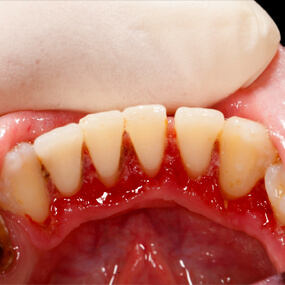How Regular Dental Visits Benefit Your Health

While you should visit your dentist to keep your teeth and gums looking and feeling great, the health benefits extend far beyond your mouth. In fact, a solid at-home dental regimen coupled with at least biannual visits to your dentist can boost your quality of life and stave off serious health conditions.
Dental professionals focus on much more than just your mouth. Even when you get your teeth cleaned, your dentist will examine your gums, throat, neck, and more and note any abnormalities that may be an indication of a health issue. A routine dental checkup can reveal much more than just tooth decay and gum disease. Dentists are often the first to recognize sleep apnea, diabetes, oral cancer, sinus problems, jaw disorders, and so forth.
Most people do not look forward to dental visits, and putting a visit off may not seem like an important decision at the time. The problem is that oral and overall health issues can arise suddenly and advance at an alarming rate. By visiting your dentist at least twice a year, you significantly reduce the chances that a health problem might catch you off guard.
Gum Disease Escalates Beyond the Mouth
Periodontitis results from the accumulation of plaque, which eventually becomes tartar. These substances contain a great deal of harmful bacteria. Left untreated, gum disease can result in discomfort and tooth loss, but the infection can spread throughout the body and even attack your immune system.
Gingivitis is gum inflammation. It is the initial stage of periodontitis and often painless and not readily apparent to the affected person. When you see your dentist, he or she will examine your teeth and gum for the deep spaces—periodontal pockets—that are often the first indication of gum disease.
The Centers for Disease Control and Prevention estimates that more than 50 percent of Americans age 30 and up suffer from gum disease. The American Academy of Periodontology recommends that all adults undergo a comprehensive periodontal evaluation every year.
A regular visit to your dentist will usually involve a dental cleaning to eliminate any plaque and tartar that has accumulated since your last visit. Regular dental cleanings are known to reduce risk factors of heart disease because the process eliminates bacteria that can enter your blood vessels.
Tartar is especially concerning because you generally cannot eliminate it through brushing and flossing at home. Dental hygienists use specialized tools to remove any dental calculus.
In addition to heart disease, gum infections have been linked to diminished cognitive abilities. A study published in the Journal of Neurology, Neurosurgery & Psychiatry involved memory testing in which it was found that older people with periodontitis underperformed individuals of a similar age who had healthy gums.
Other research has also connected gum disease to rheumatoid arthritis, which is inflammation of the joints. Studies have found that breakdown of tissue is similar in both gum disease and rheumatoid arthritis.
Like gum disease, cavities can lead to infections that spread throughout the body. Cavities can even lead to septicemia, which can result in death. Septicemia is blood poisoning, which means that the blood has been invaded by bacteria and other microorganisms that are accompanied by toxins.
Diagnosing Oral Cancers
When cancer is diagnosed early, survival rates are encouraging and getting even better as medicine continues to evolve. During a regular dental visit, your dentist will examine you for indications of mouth and throat cancer. Such signs can include lesions, sores that do not heal, and irregularities of your salivary glands. A persistent mouth ulcer, for instance, can indicate neck or head cancer.
Your dentist will also examine you for gum bleeding, an abnormal bite, cysts, and discoloration of the gums and tongue. An infection of the glands or lymph nodes can also indicate bigger health problems. Dentists want to ensure healthy oral tissues and may recommend a biopsy to ensure it. If a patient smokes or drinks alcohol, your dentist will often explain the link between oral cancer and those activities.
Diagnosing Diabetes
Diabetes can weaken your ability to fight infections, which is why gum disease is common among people with diabetes. Preventative dental care helps to avoid gum infections, and that makes it easier for people with diabetes to control their blood sugar levels.
There are other indications that can alert your dentist to the possibility of diabetes. These include gum abscesses, bone loss, and gum issues that do not respond normally to treatment. When a dentist suspects diabetes, he or she will refer you for additional testing. If you are already diagnosed with diabetes, your dentist will likely recommend a more frequent schedule for dental checkups.
Halitosis, which is persistent bad breath, is a serious concern as well. It can indicate diabetes but also acid reflux, bronchitis, kidney problems, liver problems, pneumonia, sinusitis, and oral yeast infections. Sinusitis is often confused with dental issues since nasal cavities and teeth roots are in the same area.
Eliminating Plaque, Tartar and Cavities
Even if you never skip brushing, flossing, and rinsing, there are still areas of your mouth that will be missed. As plaque accumulates, it becomes much more difficult to remove, and when it turns into tartar, it is practically impossible to remove without assistance from your dentist.
A dental cleaning eliminates tartar before it can erode your teeth, which is how cavities happen. Cavities are troublesome because they usually go unnoticed until the ache occurs, which indicates decay. That means that the damage is already done, and your dentist will have to treat and fill the cavity. People who visit their dentists on a regular basis rarely have cavities occur, and dental cleanings are certainly more economical than fillings, root canal therapies, and other dental procedures!
Other Health Benefits
During your regular visit, your dentist will also examine your jaw. A suboptimal bite can be the result of jaw misalignment, and that can lead to temporomandibular disorders that require orthodontic treatment. Another advantage of regular dental visits is that your smile always looks its best, and that has a real benefit in terms of your confidence and the first impressions you make.
The Mouth-Body Connection
Seeing your dentist twice a year—or more often if recommended—is essential to maintaining optimal oral health and providing your dentist the opportunity to diagnose potential issues before they become more serious health conditions. Early detection leads to the best results with all health issues.
We all lead busy lives, and you may be tempted on occasion to put off your regular dental visit. But you need to be proactive about your overall health, and you should use the information presented here as the motivation to stay on track, even if it may be a little inconvenient at times.
Never lose sight of the fact that a healthy mouth leads to a healthy body and a long life.
Schedule Your Checkup Today
Ensuring good oral health serves an important role in leading a healthy life. Even if you have put off seeing a dentist for far too long, the appointment you make today will be the first step toward a healthier future. Jeffrey D. Clark, DDS, is a leading dentist in the Scottsdale area, and the entire team at Scottsdale Cosmetic Dentistry Excellence is passionate about your health. Call us today at 480 585 1853 with any questions you may have and to schedule a checkup.




